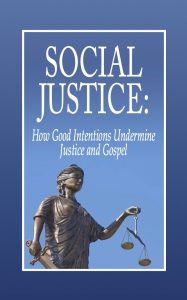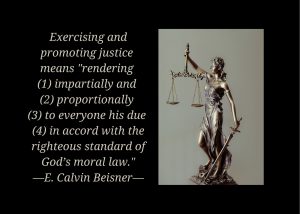Properly understood, rights are not guarantees that something will be provided for us but guarantees that what is ours will not be unjustly taken from us. That is, properly speaking, rights are not positive but negative.
—Dr. E. Calvin Beisner—
Key point: Leftists are so skilled at redefining words that they have convinced a large number people that violence really is peaceful, a man can be a woman and vice versa, tolerance has to mean approval, and injustice really is justice. Don’t be fooled by their rhetoric!
We live in a world in which a television news reporter can stand in front of a burning building, maintain a straight face, look into the camera, and tell his audience that the nearby protest was “mostly peaceful” or something similar. Consider this from a Word Foundations post that’s barely a year old.
In our last two posts — “Journalistic Malpractice, Parts 1 and 2” — we explored one facet of the problem of “newspeak,” a word that refers to the phenomenon we’ve been highlighting. That one facet is the newspeak in which reporters themselves engage. Specifically, members of the mainstream media have been and are claiming with straight faces that the protests that have occurred in the wake of George Floyd’s death have been “peaceful” or “mostly peaceful.”
To prop up this myth, reporters have had to ignore the truth in some instances (the focus of part 1) and lie in others (the main point of part 2.)
In part 2, we cited this commentary from Probe Ministries President Kerby Anderson. Take a couple of minutes and listen to Anderson’s entire presentation. Note carefully his last two sentences: “We live in a world where words like freedom, violence, and racism have been redefined. So be on the lookout for newspeak.”
We live in a world where words like freedom, violence, and racism have been redefined. So be on the lookout for newspeak.
—Kerby Anderson—
Make no mistake. Leftists have been on a mission to redefine words, and they’ve been doing it for decades. They use words as weapons to achieve nefarious ends, and redefining otherwise harmless words to make them dangerous is part of the process. I’m sure Mr. Anderson’s short list of redefined words was meant to be representative and not exhaustive. Nevertheless, he could have added another very important word to his list — and that word might very well be the most important word the left has redefined. The word I’m talking about is justice.
What Does Justice Really Mean?
With the help of Dr. Calvin Beisner and his insightful booklet Social Justice: How Good Intentions Undermine Justice and Gospel (you can order an updated edition here), we have on numerous occasions examined the true meaning of justice and its scriptural underpinnings. The material we cited then, and cite now, comes from pages 11-14 of Dr. Beisner’s book.
Exercising and promoting justice means “rendering (1) impartially and (2) proportionally (3) to everyone his due (4) in accord with the righteous standard of God’s moral law.”
While most of the words in this definition are readily understandable, the word proportionally may need some explanation.
An example of proportionality would be making a reward fit an individual’s positive contribution or crafting a punishment to fit his or her offense. For example, proportionality recognizes a difference between abuse of another’s property and abuse or violations against another individual. Further, it recognizes a difference between a death caused by accident and premeditated murder.
Yes, justice demands impartiality. It insists on giving each one what he or she deserves as an individual, not as part of a group. It means acting in ways consistent with God’s righteous law; and it means meting out punishments and commendations that are commensurate with the deed or deeds performed. We can see, then, that exercising and upholding justice may often mean acting contrary to one’s feelings.
The Hijacking of the Term Justice
Leftists have abused and misused the term justice, and they have brought a ton of emotional baggage to it as well. Dr. Beisner notes on page 21 of Social Justice that
 [i]t is tempting and common to think of social justice [or justice itself] as nothing more than “the fair distribution of advantages, assets, and benefits among all members of society,” as a website sponsored by the Department of Canadian Heritage defines it.1 That sounds innocuous. Who could be against fair distribution of anything?
[i]t is tempting and common to think of social justice [or justice itself] as nothing more than “the fair distribution of advantages, assets, and benefits among all members of society,” as a website sponsored by the Department of Canadian Heritage defines it.1 That sounds innocuous. Who could be against fair distribution of anything?
The trouble is that fairness is a moral quality and depends on there being a moral agent—someone, a person, with moral capacity—actively doing the distributing. But for the vast majority of advantages, assets, and benefits, no such person does the distributing—unless we believe God sovereignly and providentially controls all things. While that belief is Biblical, it doesn’t justify government’s intervening to change whatever has already been distributed or given, before government shows up. That is, it doesn’t justify redistribution, for God owes no one anything and therefore can “make out of the same lump one vessel for honored use and another for dishonorable use” (Romans 9:21). What, for instance, can be a more important asset than intellectual ability? Yet no one but God distributes that, and the very attempt to level intellectual ability in society requires partiality—the unequal application of rules to various people. Such partiality inevitably leads not to an increase but to a decrease in overall intellectual accomplishment. For while it is possible to restrain learning by withholding opportunities or incentives, it is impossible to force the naturally less intelligent or [the less] disciplined to learn more. We can “level down,” but we cannot “level up.”
Despite the feel-good rhetoric of the social justice movement, social justice isn’t really justice at all, but injustice.
This is a big reason why social justice actually is injustice. At its core, it is all about redistribution of resources. It seeks to take from those who have and give to those who have not, or who have less. But any redistributive scheme would require, not only partiality, but also theft of private property. Theft, like partiality, is a form of injustice.
A Warped View of Rights
There’s something else. The social justice perspective has a warped view of rights. It sees rights as something the government creates, engineers, and maintains, while the Founders believed rights already were present, bestowed by God to every human being by virtue of his or her having been made by God in His image. Learn more about rights in this brief article, “The Nature of Unalienable Rights.”
Negative rights are the rights we enjoy because government is restricted from forbidding or hindering personal activity. Positive rights are “rights” that are secured when government intervenes in citizens’ lives to give them resources or to otherwise enable them to do or to have certain things. Generally speaking, America’s Founders and early leaders upheld the former, and in only a few instances the latter (such as an individual’s right to a trial by jury). Accordingly, they drafted and ratified the Bill of Rights to the US Constitution, which secured foundational rights of citizens through government limitations.

Social justice crusaders, intent on redistributing resources to achieve what they believe to be “fairness” and “equality,” actually are holding a view of rights that is illogical, unsustainable, and even impossible to achieve.
Drawing from economist Walter Block, Dr. Beisner demonstrates (on pages 17-18 of Social Justice) that negative rights are applicable in society at large, reasonable, and workable; and that positive rights are unrealistic and unworkable, sometimes even to the point of being absurd. Summarizing Beisner’s discussion of Block, we note the following.
-
-
-
- Negative rights transcend time. Just as a prehistoric man or woman could enjoy his or her right to be left alone, so can we. The same is not true of positive rights. We never can reasonably say that a person from the 18th century had a right to modern, 21st century medical care or modern means of transportation, can we?
- Negative rights are readily understandable because they are easily recognized. Moreover, they are realistic. We can respect negative rights of others by resolving not to kill them, steal from them, or lie about them; but we cannot, simply by resolving to do so, give everyone in the world the same standard of living most North Americans enjoy. We actually can’t do this by trying to engineer it, either. It simply isn’t possible.
- A negative-rights perspective is realistic about the difference between moral and immoral actions by human beings and acts of nature. Ridiculously, a positive-rights perspective implies that a tornado that destroyed a family’s home violated that family’s rights!
- Because “positive rights are not merely equal rights but rights to equal things,” a positive-rights perspective can make the case that any inequality between individuals or groups is a violation of rights. A negative-rights perspective, however, sees rights in terms of equal opportunities for all, regardless of the other differences that exist.
- Where is the concept of charity in a positive-rights point of view? Even if you look high and low, you won’t find it. If government is charged with securing and maintaining positive rights, it and it alone is the benefactor. In addition, a positive-rights perspective implies that when an individual gives money to help the poor or otherwise disadvantaged person, any discrepancy in the assets of the recipient and the assets of the giver after the gift represents a violation of the recipient’s right to equality!
- A positive-rights perspective asserts that equal outcomes are desirable, yet some attributes among individuals cannot be equalized. The family into which one is born, age, IQ, height, sex—all of these and more—are differences that cannot be altered or changed (despite everything the transgender movement claims). On the other hand, negative rights are equal at the outset and can be applied to everyone universally. For example, we readily see that each person has an equal right not to be mistreated, molested, or mugged.
-
-
Recall the quotation from Dr. Beisner that we cited at the top of this post. “Properly understood, rights are not guarantees that something will be provided for us but guarantees that what is ours will not be unjustly taken from us. That is, properly speaking, rights are not positive but negative.”
The Founders Rightly Believed in Equal Opportunity, Not Equal Outcomes — We Need to Do the Same
In concluding, let’s consider a bit further the idea of equal outcomes versus equal opportunities. Because of the above realities, as well as the truth that incentive and responsibility go together, America’s Founders (George Washington and Thomas Jefferson among them) believed in equal opportunity, not in equal outcomes. This actually is the only approach that truly is just.

Implementing efforts to engineer equal outcomes is inherently unjust and a killer of incentives to act creatively, to work, and to achieve. Moreover, when equal outcomes are engineered, the unalienable rights of one or (more likely) many are hindered.
These are the harsh realities the rhetoric of the social justice movement ignores. When thinking of and speaking about justice, resist following your feelings or the cultural narrative.
Don’t be fooled by social justice crusaders’ new definitions. Social justice isn’t justice at all, but injustice.
Because of the social justice movement’s obsession with redistribution of resources to achieve equality, it cannot be otherwise.
Copyright © 2021 by B. Nathaniel Sullivan. All rights reserved.
Unless otherwise indicated, Scripture has been taken from the New King James Version®. Copyright © 1982 by Thomas Nelson, Inc. Used by permission. All rights reserved.
Note:
1Since Dr. Beisner’s book was first published in 2013, the website he cited for this definition has since been removed. However, it isn’t difficult at all to find other places on the Internet that define social justice in this way. Here is one webpage.




Be First to Comment